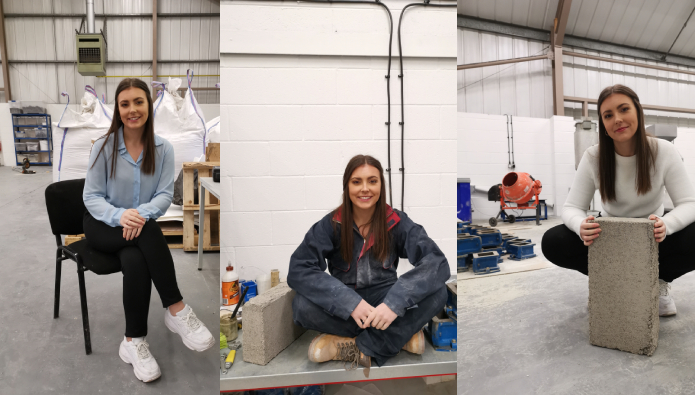Developing and constructing homes in an eco-friendly way – to lower the property industry’s currently high carbon footprint – has become more important than ever in recent years with sustainability and green issues finally entering the mainstream agenda.
Natasha Boulding, a 27-year-old Chemistry graduate and PhD from Durham, has created Sphera to transform plastic waste into aggregate, producing carbon negative concrete blocks. The startup company, which has its headquarters in Stockton-on-Tees and was founded in 2019 as Plastech Innovation, will enable construction firms to lower their carbon footprint as less waste will be sent to landfill or incineration - reducing CO2 emissions while recycling plastics.
Here, we speak to Boulding – who also spent nearly four and a half years at the University of Durham as a postgraduate and postdoctoral researcher – about her recent Innovate UK’s Women in Innovation Award, improving female representation in engineering, construction and property, and whether the industry can ever become truly carbon neutral.
You were recently one of 40 women to win Innovate UK’s Women in Innovation Award, and the only winner who works in the property industry - can you tell us a bit more about this and what you plan to do with the £50,000?
It’s amazing to be recognised as a Women in Innovation Award winner and for Innovate UK to celebrate female entrepreneurs from across the UK with exciting, innovative ideas and ambitious plans.
I’m looking forward to using my platform to grow the business, continue to innovate and inspire others. The property industry is so broad and collaborative, with so much to offer.
Tell us a bit more about Sphera and its ultimate goal...
Sphera is a speciality materials company in the construction sector focusing on sustainable, low-carbon material alternatives. Currently, it is developing carbon zero and carbon negative concrete using plastic aggregate (from waste), and concrete admixtures to accelerate concrete curing rate and decrease cement content. These innovations help to simultaneously tackle climate change and plastic pollution.
Sphera Ltd. is a private limited company co-founded in 2019 by me, Phil Buckley PhD and Scott Bush, who have significant experience in scientific research and innovation including synthetic polymer chemistry, functional surface chemistry and nanotechnology. We have spent a significant amount of time working in multidisciplinary teams to combat relevant technical and commercial challenges across a wide range of industries.

The team are currently focused on the development of SpheraLite™ and SpheraZero™ which are carbon negative lightweight blocks and carbon zero dense blocks. The innovation has the potential to reduce the carbon footprint of incumbent blocks by 134%.
The ultimate goal is to continue to invent low-carbon building material/additives to contribute to net-zero and beyond.
Why did you start the business in the first place?
The company is a result of a joint passion to use interdisciplinary problem solving to challenge industry ‘norms’ and create a more sustainable world. Sphera has gained national and international recognition, publicity and awards.
Why is it important for the construction industry to lower its carbon footprint?
The built environment is responsible for 38% of global energy-related eCO2 emissions, with 8% of global emissions attributed to concrete production. The industry recognises that sustainability must be a primary consideration moving forward.
This is evidenced by the emergence of eCO2 emission reduction targets for construction projects and a significant growth in the global market for sustainable construction materials. It is becoming increasingly common for architects/developers to consider sustainable/low-carbon building material alternatives in order to meet carbon targets.
Concrete is the most widely used man-made material in existence. In fact, if the concrete industry were a country, it would be the third largest emitter in the world. Innovation in this industry is vital to achieve net zero by 2050 and the 78% decarbonisation target by 2035.
As a female entrepreneur in a still largely man's world, what can be done to encourage more women into engineering, construction and property more generally?
An increase in female role models in careers that are typically seen as male-dominated is really valuable to encourage the next generation of females in construction, engineering and science. I mentor females in STEM from all things including career choice, academia and entrepreneurship.
Programmes like Innovate UK’s Women in Innovation Award, which offers a package of support tailored to the individual’s needs – from mentorship to immersing themselves in a network of like-minded women - are vital to support females in their roles to grow and succeed.
Has your gender or relatively young age been a barrier for you so far in launching Sphera?
Construction and property is renowned for being a traditional industry. Our team’s relatively young age has often been a barrier to gaining that first meeting or foot in the door. However, when we start talking to potential customers about our products, technical data, experience and innovation pipeline, any pre-judgments regarding age seem to disappear.
Where do you see your business in five years' time?
Many innovations taking place in the built environment sector focus on decreasing the carbon emissions associated with construction over the lifetime of a building - e.g. improved insulation and energy efficiency. However, due to the increasing pressure to meet new more challenging targets (including net-zero construction projects) the market is now shifting focus to reducing the embodied carbon content associated with constructing a building.
SpheraLite™ and SpheraZero™ blocks are designed to perform identically to current market-leading lightweight and dense blocks. Unlike incumbent blocks they allow customers to more easily meet carbon targets/offset carbon of additional building materials, whilst not compromising on material performance. We are currently in the process of finding demonstrator projects to trial the blocks.
Sphera’s innovation pipeline also includes speciality admixtures to increase concrete curing rate and decrease the quantity of cement required. This not only has the potential to increase production rate (due to faster demoulding), but has the potential to decrease the carbon footprint even further for the customer.
Can the property industry ever reach the goal of becoming carbon neutral or even carbon negative? Or is that a mere pipe dream?
The construction industry can absolutely become net zero. There are plenty of new innovations and new technology emerging that focus on sustainability and carbon reduction. To reduce carbon considerably will require forward thinking individuals/companies and cross industry collaboration.
For more information/collaboration opportunities, you can email: info@sphera.uk







/RishiSunak-400x310.jpg)

.jpeg)
.png)

.jpg)








Join the conversation
Be the first to comment (please use the comment box below)
Please login to comment